
In this issue...
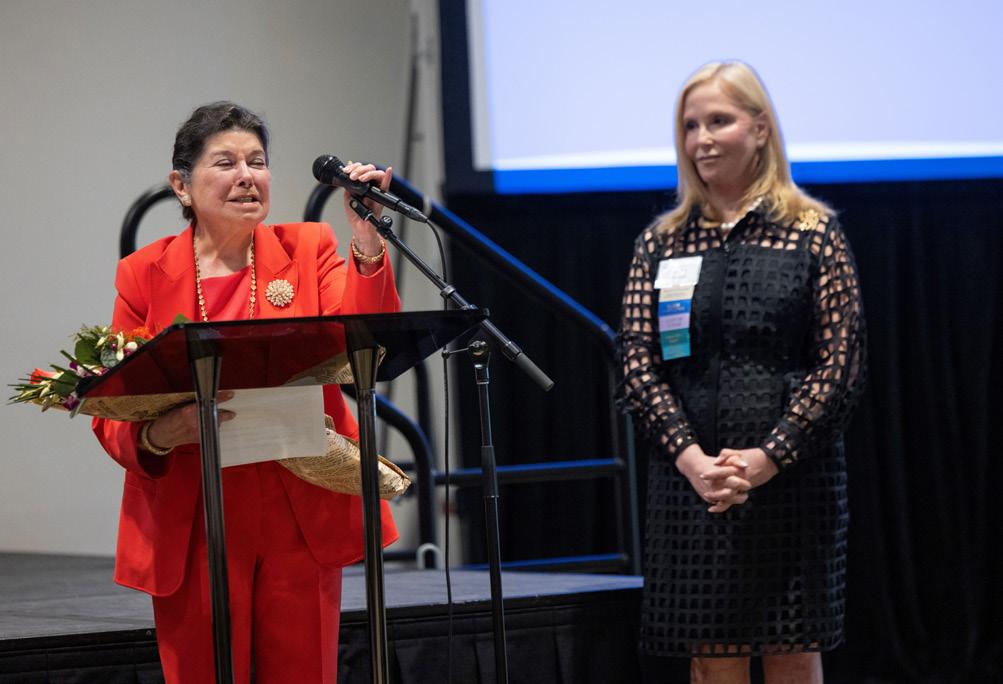
Federation breaks annual campaign record
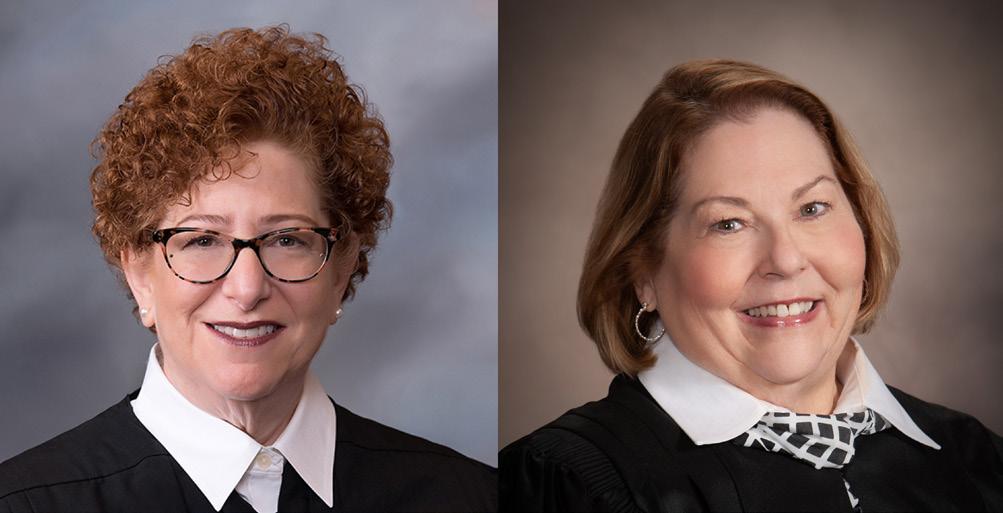
JULIETs to discuss Kansas Judicial Branch
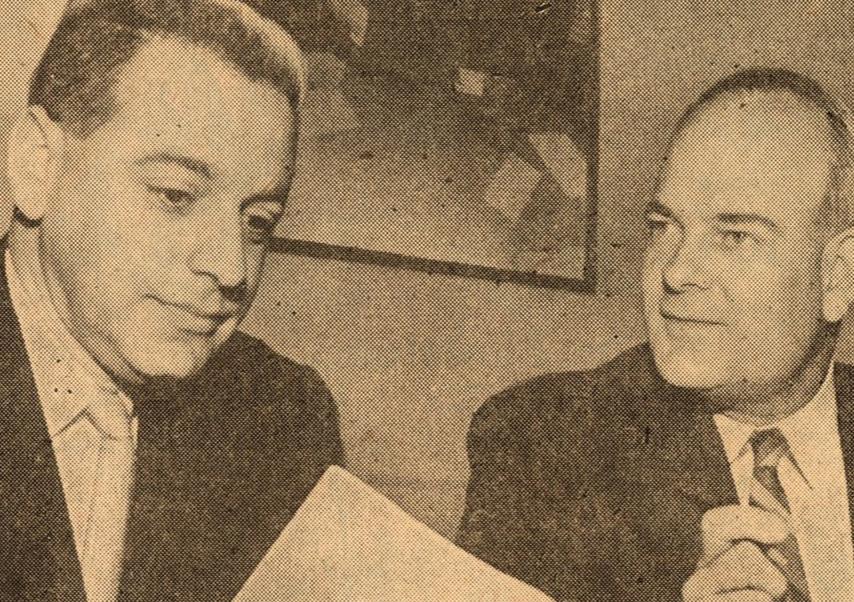
Sachs papers chronicle legacy of activism
Parashat Yitro
Shabbat times (Overland Park):
Candlelighting: 5:37 p.m.
Havdalah: 6:37 p.m.



Federation breaks annual campaign record

JULIETs to discuss Kansas Judicial Branch

Sachs papers chronicle legacy of activism
Parashat Yitro
Shabbat times (Overland Park):
Candlelighting: 5:37 p.m.
Havdalah: 6:37 p.m.
By Kevin Deutsch Special to The Chronicle
For 46 years, legal trailblazer Sherrill Rosen has drawn on the Jewish concepts of tikkun olam and tzedakah while working to protect vulnerable children, seniors and domestic violence victims across Jackson County, Missouri.
From helping draft Missouri’s first adult abuse law as a Legal Aid attorney to presiding over more than 12,000 cases as a family court commissioner in the Circuit Court of Jackson County, the Jewish jurist worked unremittingly in the interest of justice, her colleagues said, guided in part by the Hebraic wisdom her family imparted.
“My grandfather instilled in me Jewish values like tzedakah, that you give of yourself,” Rosen, 70, said in a recent interview with The Chronicle. “You try to do the right thing, and you hope it makes a difference.”
By Sam Kricsfeld Editor
The second phase of the Kansas City Jewish Community Digital Archive will debut with an interactive timeline of The J available online. In addition to showing The J’s legacy, the digital timeline will serve as a prototype for how other community organizations can preserve and share their histories.
The Jewish Community Digital Archive’s first phase was launched in 2022 with the digitization of The Kansas City Jewish Chronicle’s back issues

and local history video interviews. Spearheaded by Andrew Kaplan, Alan Edelman and Norman Kahn, the archives have proven useful — Kaplan
See page 8

Jackson County Commissioner Sherrill Rosen receiving the Roger P. Krumm Family Law Award in August of 2024.
Rosen, among the most decorated legal professionals in Missouri, retired last month after more than 30 years on the bench and a career that indelibly shaped adult abuse laws,
guardian ad litem practice and family court practice in Jackson County.
A Kansas City, Missouri, resident and member of The Temple, Congregation B’nai Jehudah, Rosen presided over thousands of child custody, divorce, paternity and juvenile matters from her bench in the Eastern Jackson County Courthouse in Independence, Missouri.
Her career as a commissioner was preceded by 16 years of practice as an attorney, during which judges frequently appointed her as a guardian ad litem for children in family law cases. Handling many of the county’s most heart-wrenching cases, she earned a reputation as a compassionate, tireless advocate for vulnerable kids and adults.
Later, as a family court commissioner dealing with families in crisis, Rosen remained steadfast in her commitment
See page 5
By Martha Gershun The New Reform Temple
The New Reform Temple (NRT) has announced Rabbi David Levinsky, Ph.D., will become the congregation’s new rabbi. He will begin his new role on July 1 upon the retirement of Rabbi Alan Londy, who has served the congregation in this role for 14 years and will become the Temple’s first rabbi emeritus.
“We are very excited to welcome Rabbi Levinsky as the next rabbi of The New Reform Temple,” NRT Board President Joyce Hess said. “He is an exemplary professional and a perfect fit for our congregation.”
Rabbi Levinsky will be relocating from Chicago, where he is currently an instructor at Loyola University,

Rabbi David Levinsky
teaching a chavruta-style class of introduction to Judaism to undergraduate students. Most recently, he served as senior rabbi at Temple Har Shalom in Park City, Utah, for nine years. During that time, he helped the congregation
See page 3
Jewish Federation of Greater Kansas City raised more than $5.5 million via its 2024 campaign, marking the largest amount raised in an annual campaign to date. This follows 2023, when Jewish Federation took in more than $10 million in total fundraising, including $3.6 million for Israel.
“This remarkable success reflects so much hard work by our volunteer and professional leadership, but it really speaks to our incredible donors,” said Jay Lewis, president and CEO of Federation. “Kansas City is such a special Jewish community. The generosity and commitment to Jewish life is truly humbling.”
More than 1,100 people, some giving as households, contributed to the campaign, with more than 225 being new or renewed investments from those who had stopped giving to the campaign for at least a year. Some 37% of donors increased their giving to the campaign in 2024, including many who supported the Israel emergency campaign in 2023.
“I am so proud that so many people trust the Jewish Federation with their philanthropic dollars to make an impact on this community and Jewish communities around the world,” Lewis said.
Examples of this trust include a large IRA distribution last May that was extra impactful given the

2:1 match available on new gifts, thanks to Shirley and Barnett C. Helzberg Jr. and funds raised in their honor.
“It is important to thank and recognize both our volunteer leadership and our hard-working staff,” said Derek Gale, vice president and chief operating officer for Federation. “Campaign Chair Jeremy Antes brought key relationships to our fundraising efforts, and the staff team worked extra hard to bring more than 20 new Ben Gurion Society households into the fold. These young philanthropists represent the future of our community.”
Gale noted that some young couples went from giving $180 in 2023 to $500 or $1,000 in 2024.
Funds raised in Federation’s annual campaign are put toward fulfilling Federation’s mission of sustaining and enhancing Jewish life at home and around the
world. Millions of dollars are allocated each year to partner agencies and programs across the Kansas City Jewish community, and millions more to support Israel and global Jewry. Aside from the $5.56 million raised in the annual campaign, Federation also raised money last year for several special funds. The Chesed Fund, for example, providing lifesaving help to those in need of both emergency and longer-term financial assistance, was replenished as Federation staff — in partnership with the Jewish Community Foundation — raised more than $250,000 last year for this purpose. Sasone, Federation’s program ensuring access Jewish opportunities and education to students and community members with disabilities, received some $180,000 in grants and donations.






The Epsten Gallery at Village Shalom is hosting “The Bloch Family: A Visual Legacy,” presented in partnership with the Marion and Henry Bloch Family Foundation in celebration of H&R Block’s 70th anniversary.
The free exhibition will run through March 24 and features 17 pieces from H&R Block’s art collection, with a particular focus on four Kansas City area artists: Jason Pollan, Adolfo Gustavo Martinez, Tom Gragg and Matt Kube. In addition, personal artifacts from the Bloch family’s history will be incorporated into the display. Several artist
talks will be scheduled during the exhibition’s run.
In celebration of H&R Block’s 70th anniversary, “The Bloch Family: A Visual Legacy” was created to reflect the Bloch family’s dedication to Kansas City’s Jewish and arts communities. Henry and Richard Bloch further instilled this dedication to community when H&R Block was founded. This legacy continues through Make Every

Block Better, H&R Block’s community impact platform focused on bringing communities together and giving back.
This is the first external exhibition at The Epsten Gallery since stewardship of the gallery was entrusted to Village Shalom. Daily exhibition hours are 10 a.m. to 5 p.m. More information is available at villageshalom.org/events.
“The Bloch Family: A Visual Legacy” Daily until March 24, 10 a.m. to 5 p.m. The Epsten Gallery, 5500 W. 123rd St., Overland Park, KS 66209
The following are the deadlines for articles, celebration announcements, Spotlight pictures, advertisements and editorials for upcoming Chronicle print issues. If you have any questions, please contact Sam Kricsfeld at samk@jewishkc.org.
continued from page 1
grow from 300 to 400 members; developed an inclusive approach to Judaism that emphasized love of Judaism and love of the Jewish people over status as a Jew; and started an interfaith dialogue among the local Mormon, Muslim and Jewish communities.
Rabbi Levinsky also spent six years as associate rabbi at Chicago Sinai Congregation, where he helped edit the contemporary, gender-neutral edition of “The Union Prayer Book” that is currently in use at NRT.
Rabbi Levinsky received a BA in English with a focus on Jewish studies from Indiana University; a Masters of Hebrew Letters and rabbinical ordination from Hebrew Union College-Jewish Institute of Religion; and a Ph.D. in religious studies from Stanford University. He has studied Hebrew, Aramaic, Syriac and Koine Greek and is deeply interested in music, including guitar playing, songwriting and record collecting.
While studying for his doctorate and working on his dissertation, Rabbi Levinsky served small congregations in Castro Valley and Palo Alto, California, and worked at the Jewish Community Center in San Francisco, where he created programming to teach non-Jews about Judaism.






















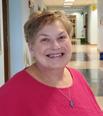


“I am honored and delighted to become the rabbi of The New Reform Temple,” Rabbi Levinsky said. “I feel called to serve a small congregation, and this opportunity is my wish come true… Since I sat down in Jerusalem for my first day of rabbinic school, I have changed as a rabbi. Yet, the values and beliefs that drove my rabbinate then continue to drive my rabbinate now.”
“The relationships that I have forged over the past 15 years have helped me grow and have expanded my kindness, my openness, my deep love of God and my humility,” he continued. “I am very excited to join The New Reform Temple and the broader Kansas City Jewish community.”
Rabbi Levinsky is married to Kate Phillippo, a professor in the Schools of Social Work and Education at Loyola University in Chicago. Their son, Noam, is an undergraduate at the University of Chicago in Urban Studies.
Community member

Michael Crane will host “Beyond The Schmear: Tradition Meets Creativity,” a class on the interesting relationships between bagels and schmear in Paola, Kansas. The class, spon sored by Slow Food Kansas City, will be held at Somerset Ridge Winery (29725 Somerset Rd., Paola, KS 66071) between noon and 2 p.m. on Sunday, Feb. 16.
Attendees can explore a range of traditional and nontraditional bagels and schmears that have been paired with Somerset Ridge wines. The class will include information on how to best shape and bake a bagel; exploration of cream cheese schmears, lox

pairings and variations of Italian and Tex Mex combinations; how to cure salmon for fresh lox; experimentation with dessert schmears; and how to best pair wine with attendees’ bagels and schmear.
Spaces are limited, and advanced registration is required. Slow Food Kansas City members receive a discount. Registration and payment information is available at slow-foodkansas-city.square.site.
Crane has previously worked with the local chapter of the global Slow Food movement for a Passover food class in 2024, raising money for Jewish Family Services’ food pantry.
“Beyond The Schmear: Tradition Meets Creativity”
Sunday, Feb. 16, 12 p.m. to 2 p.m. Somerset Ridge Winery, 29725 Somerset Rd., Paola, KS 66071

Take a look inside Village Shalom to see our remarkable Assisted Living and Memory Care communities. Maintenance-free, private apartments and specialized care from our caring staff give peace of mind to you and your loved ones. Learn more at VillageShalom.org or call 913-303-4826 or 913-317-2600 to tour our welcoming senior living community. We look forward to showing you what peace of mind looks like. Welcome to The Village.

Marilyn Naron, a local author-illustrator and former pastry chef, will hold an art exhibition and discussion, “I Do Not Want Your Sympathy: Shiva, Snacks, and the Art of Remembering,” at the Lawrence Jewish Community Congregation (LJCC).

This event, part of LJCC’s third annual Telling Our Stories Through Food series, will take place on Saturday, Feb. 22, at 7 p.m.
A section of author-illustrator Marilyn Naron’s “I Do Not Want Your Sympathy” triptych.
Naron will discuss her recent art commissioned for the Kansas Book Festival, including the central piece, “I Do Not Want Your Sympathy,” a triptych painted and collaged entirely from sympathy cards her family received after the death of her sister from a rare cancer in 1996.
Naron is currently at work on an illustrated memoir, “How to Draw a Sister,” and will discuss how food, sympathy and memory come together in that project. She will explore the connection between food and Jewish death rituals and talk about how they affect people; if and when they bring actual comfort; and what we remember later. The evening will also feature pastries especially prepared by Naron for the occasion and a collective art project drawing on the experiences of those in attendance.
“This is a unique occasion — not just for the LJCC, but within the broader community,” LJCC Director Lara Giordano said. “Marilyn’s project gives us an opportunity for rich

reflection on subjects that are crucially important to all of us, but which we so rarely discuss because of the deeply personal nature of death and illness. To be able to make something collectively — to produce art — as an outcome of such a conversation is something special. I hope many people from within and beyond the Lawrence Jewish community feel welcome to attend.”
The event is free and open to the public, although the LJCC does request advance registration by Feb. 13 in order to accommodate all those who wish to attend. Registration and more information can be found at ljcc.shulcloud.com/event/TOSTF.
An annual series hosted by the LJCC, Telling Our Stories Through Food focuses on food, cooking traditions and homes as the link between generations and communities with the goal of helping people to connect with each other. Telling Our Stories Through Food has previously featured author and Kansas Poet Laureate Emeritus Caryn Mirriam-Goldberg in 2023 and San Francisco State University Professor of Religion Dr. Rachel Gross in 2024.
Marilyn Naron at LJCC
Saturday, Feb. 22, at 7 p.m. LJCC, 917 Highland Dr., Lawrence, KS 66044


continued from page 1
to protecting children and seeking justice.
“You have to make those tough calls, always keeping the child’s stability and wellbeing as the top priority,” said Rosen, who’s chaired the Independence Coordinated Community Council on Domestic Violence in Independence for the past 25 years.
Long before making legal history with her work protecting domestic violence victims, Rosen was a talented student with an interest in Jewish learning. Born in Denver, Colorado, to parents Sandra Collinger Rosen and Maynord Rosen, she grew up in St. Louis, Missouri, and, at age 20, earned a bachelor’s degree in journalism from the University of Colorado at Boulder.
The future commissioner was heavily influenced by her grandfather, Harry Collinger, a leader in St. Louis’ Jewish community. Collinger had graduated law school but saw his hopes of practicing dashed by the economic realities of the Great Depression.
In a move that made Collinger proud, Rosen set off for the University of Missouri School of Law and earned
her J.D. in 1978. She landed a job with Legal Aid of Western Missouri and passionately represented domestic violence survivors in family law cases, among other clients.
A tenacious litigator, Rosen’s work led to her collaborating with then-State Representative Alan Wheat and others to draft Missouri’s first adult abuse statute. She also lobbied for passage of the landmark legislation, which created a legal mechanism to remove domestic abusers from victims’ homes.
The law paved the way for similar state statutes across the U.S. and helped shatter taboos surrounding domestic violence.
“These issues weren’t talked about at that time,” she said. “They were incredibly important to address.”
When Rosen used the new abuse statute to request an order of protection for a female client, a lower court denied her request and ruled the law unconstitutional, putting hard-won victim protections at risk.
The ruling set up a constitutional challenge to the statute in 1981, which Rosen also handled.
“I just happened to catch the case [that led to the challenge],” Rosen re-
called. “I was working for Legal Aid at the time, and we had the resources to handle it. And frankly, it was pretty scary. If [defense of the statute] didn’t succeed, who knows what would have happened to all the other statutes across the country?”
The Missouri Supreme Court upheld the law in 1982, cementing Rosen’s status as a top-notch legal mind and, colleagues said, likely saving the lives of numerous abuse survivors.
After leaving Legal Aid in 1982, Rosen entered private practice and spent 12 years representing children and families in Greater Kansas City. Her trial and appellate work deeply impacted family law practice across the state, colleagues said, while her tireless advocacy for the vulnerable frequently led courts to appoint her as a guardian ad litem.
No statutory authority or blueprint for guardian ad litem practice existed in Missouri at the time. Working from scratch, Rosen pioneered the field in Jackson County and trained scores of professionals in the practices she’d developed.
Thousands of children have gained legal protection as a result of her ef-

forts, her colleagues said.
“What’s wonderful about Commissioner Rosen – and what is an incredible testament to her character – is that she truly cared for the families [in her cases],” said retired Circuit Court Judge Marco Roldan, a longtime colleague of Rosen’s. “She stood out for her intelligence, her character, and by spreading her care not just to litigants but by educating other judges in how to do things the right way. She’s had a huge impact.”
When judges called upon Rosen to hear family court matters in Circuit Court in Jackson County in 1994, she was one of just a handful of women on the bench there at the time.
She also presided over Jackson County’s Success Court, a truancy prevention program aimed at helping youngsters stay in school.
“She pairs her legal acumen with a deep connection with children, a rare blend of talents that give her a unique ability to see children, to hear children, and to understand children,” former Circuit Court Judge Patrick Campbell wrote in a tribute to Rosen.
Rosen has won numerous awards for her work protecting families including the inaugural Hon. Kelly J. Moorhouse Dedication to Children Award (2013), the Missouri Lawyers Weekly Women’s Justice Award (2014), the Roger P. Krumm Family Law Award (2024) and the Kansas City Metropolitan Bar Association’s Lifetime Achievement Award (2024).
As she packed up decades worth of possessions in her chambers recently, Rosen said she’d introduced the Jewish concept of tikkun olam – repairing the world – to other legal professionals seeking to make a difference.
“Not that we can save the world as judges, but we can think about doing good and doing what’s right in these jobs, making the difficult decisions and just doing your best,” she said.
In recent weeks, Rosen has received emails from female lawyers who said she’d mentored and helped them become better attorneys. Others have reached out to say she made a positive difference in their lives.
“Justice is what love looks like in public,” Rosen said, quoting a Cornel West phrase that has long guided her work. “I’ve tried to live up to that.”


In February of 1995, The Chronicle began using computer software to help lay out the newspaper. Because of the extra time it took (back then) to use computer software, The Chronicle staff needed to change the deadline from 5 p.m. up to noon.

In 1970, Rabbi Morris Margolies (left) of Congregation Beth Shalom discussed peace in the Middle East with Missouri Senator Stuart Symington shortly after the National Emergency Conference on Peace in the Middle East.

In February of 1945, the Kansas City City Council passed an ordinance which prohibited “the printing or distribution of anonymous hate literature.” It became a misdemeanor to publish or spread “any material which tends to hold any racial or religious group to hatred, ridicule, or contempt.” Violaters of the ordinance would be liabole for a fine of up to $100 or up to 90 days in prison.
Find these historical stories and more community history at kcjc.com/archive, and check The Chronicle’s Facebook and Instagram pages for weekly “Throwback Thursdays” from the archives.


FLAGFOOTBALL
HOWARDSACHS JULIETS WOMENSHOOPS JCFTRUSTEES BEYONDTHESCHMEAR
MARILYNNARON
• Beyond the Schmear (pg. 4)
SHERRILLROSEN
• Chidush (pg. 13)
• Digital archives (pg. 1)
• Epsten Gallery (pg. 3)
• Flag football (pg. 9)
• Howard Sachs (pg. 14)
EPSTENGALLERY DIGITALARCHIVES
• Marilyn Naron (pg. 4)
RABBIDAVIDLEVINSKY KAKEHASHI
• JCF trustees (pg. 10)
• Rabbi David Levinsky (pg. 1)
CHIDUSH JDAIM TUBSHVAT SUPERBOWL
• JDAIM (pg. 11)
• JULIETs (pg. 8)
• Kakehashi (pg. 12)
• Sherrill Rosen (pg. 1)
• Tu B’Shvat (pg. 8)
• Women’s Hoops (pg. 13)


of Learning

Jewish community professionals participated in A Day of Learning Community Symposium on Feb. 4. The day was organized by Jewish Experiences, a collaboration of Jewish Federation and The J, in partnership with 18 Doors, an organization supporting the inclusion and engagement of interfaith couples in Jewish life.
(top, from left) are Melissa Kingston, Carly Stein, Bridey Stangler, Sierra Debrow and Taly Friedman; and (above) Mika Kislanski, Robin Levine, Alissa Sanderson, Stein, Bailey Nakelsky, Cindy Bodker and Molly Hess.


Knead a Night Out


BBYO alumni gathered at Paint Glaze & Fire on Feb. 2 for a BBG reunion, sponsored by Sara Nicole Glass (Beth Torah's Weiner Religious School Director) and subsidized by the Federation's Just Because Grants.

Jewish Community Foundation fundholders and staff learned about the work of KC Kosher Meals on Wheels during a recent site visit to its expanded facility.


Rebecca Kidwell of Geeks for Kids, an organization that builds custom electric cars for children with mobility problems, with Judy Jacks Berman at the Jan. 23 JULIETs event. Berman has family who benefited from similar programs to Geeks for Kids.


Beth Torah's Weiner Religious School TAG and confirmation students met up at the ICJC Mosque to learn about interfaith neighbors and compare their customs to




By Ellie Holsten
Tu B’Shvat is an ancient Jewish agricultural holiday. According to Jewish law, the products from fruit trees are not to be eaten by anyone when the tree is three years old and younger, given to the temple when the tree is four years old, and the property of the farmer after the fifth year. To simplify that, Tu B’Shvat was added to the calendar to be the birthday of every tree planted that year.
This silver tray from around 1900 has Hebrew text for a blessing for trees and the date of Tu B’Shvat with the inscription “new year for trees.” The palm tree on this tray has Hebrew for “a righteous man like the palm tree will blossom,” a saying from Psalm 92, next to it. The olive tree is paired
with the words, “I’m like a fresh olive.” These words are taken from a verse in Psalm 52 about thriving in the faithfulness of God.
Objects for Tu B’Shvat often display the Seven Species of Israel, the seven agricultural products historically grown in Israel, but the bowl at the center of this tray contains other fruits not native to Israel such as strawberries, pears and cherries.
More information about the Michael Klein Collection at the Temple, Congregation B’nai Jehudah can be found at kleincollection.org or by calling (913) 663-4050 to schedule a tour.
The Kansas City Jewish Chronicle and the Klein Collection are partnering to share and highlight some of the collection’s unique pieces.
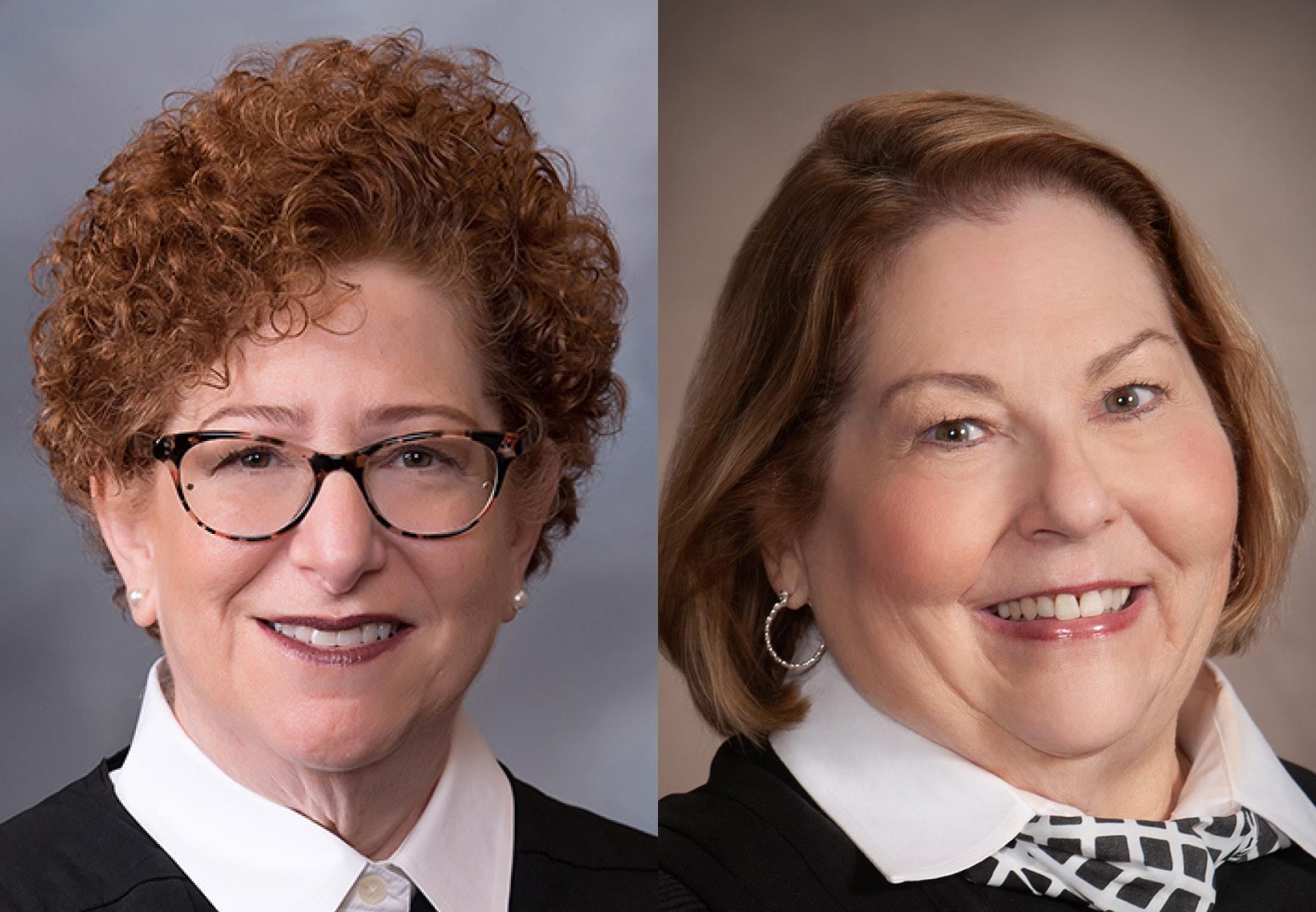
Jewish Unforgettable Ladies Interested in Eating Together (JULIETs) will host Kansas Supreme Court Justice Melissa Standridge and Kansas Court of Appeals Judge Karen Arnold-Burger for a presentation and roundtable discussion on the Kansas Judicial Branch. The event will be held at Congregation Beth Torah (6100 W. 127th St., Overland Park, KS 66209) on Sunday, Feb. 23, at 12:30 p.m.
Justice Standridge and Judge Arnold-Burger will discuss their personal journeys to the bench, the role of the judicial branch in state government, the process involved in deciding cases and the judicial selection process. Attendees are asked to arrive 10 minutes early to check in. Time will

be reserved for individual questions. Beverages and paper goods will be provided.
Reservations are required by Thursday, Feb. 20, by contacting Susie Klinock at JULIETs.KC@gmail.com. Jewish women (and non-Jewish women with a Jewish spouse) are invited to all JULIETs events, and no synagogue affiliation is required. Attendees should bring their own lunch or snack; JULIETs will provide beverages and paper goods.
Sunday, Feb. 23, at 12:30 p.m.
Congregation Beth Torah, 6100 W. 127th St., Overland Park, KS 66209
continued from page 1
used the archives to compile a presentation on the history of the Menorah Heritage Foundation, for example, and The Chronicle utilizes its digital archives for history presentations and weekly Facebook and Instagram posts featuring older stories. The archives have also been used for organizational and genealogical history.
The project’s second phase aims to create and launch a template that community organizations can utilize to compile and display their history online. With this goal in mind, Kaplan and community member Bob Grant wanted to create a functional prototype to showcase how archives can be compiled and visualized.
The idea, as Kaplan put it, is “build
one, sell many” — with a working prototype, the archive team hopes that other organizations will take part and use the template to make their own timelines and tell their own histories.
Kaplan and Grant picked The J as the debut organization to showcase how the digital timeline can be adapted for any organization. Both Kaplan and Grant are former board chairs of The J, and Grant has been compiling its history in his retirement, so they have (and have access to) a wealth of knowledge about the organization.
“I sat at a past presidents’ meeting, and I listened to a couple of our elder statesmen talk,” Grant said. “I was thinking to myself, ‘Oh my gosh, we got to capture this.’ They have stories that are just fantastic, and they bring
them to life.”
By using resources such as the past presidents, documents and issues of The Chronicle, Grant began to compile the history of The J. Grant and Kaplan told The J’s leadership that they would “let the board and staff [of The J] stay future-focused, and let us worry about the history.” The J’s president, Jim Sluyter, was enthusiastic about the project.
“I love for The J’s story to be told to the community, [as well as] the impact we’ve had,” Sluyter said, “so I think it is important to tell that story and to get the word out… Having a tool to be able to easily go back and look at the history of The J would be incredible.”
With the idea of an interactive timeline, the archive team and The J began looking for software or applications
that could work for various organizations and be user-friendly for both administrators and web users.
“What we want is this 3-D feeling that you’re moving through history as we’re telling the story,” said Alissa Sanderson, The J’s chief marketing and communications officer. “We also wanted to find a tool that any agency could use on the backend, something that was simple to create and maintain.”
Sanderson found a program called Tiki-Toki, which provides customizable, three-dimensional timeline templates that can be adapted to show organizations’ histories. The ability for images, audio, video and text to be integrated into the timeline will allow everything from documents
continued on next page
continued from previous page
and artifacts to testimonies and recordings to be stored, searchable and accessible.
Grant’s undertaking to assemble the history of The J has resulted in enough milestones and information to put as points on the prototype timeline, such as location changes and leadership transitions. Grant said that more information and details can be added to the archives at any point.
Kaplan said that the archive team made a commitment to help train other organizations on how to create and manage their timelines should they partake in the archive’s second phase.
“All [organizations] have to do is pull together their stuff,” Kaplan said. “That’s it. They don’t have to think about technology — technology is already done. They don’t have to think about where it’s hosted. It’s already hosted.”
Kaplan said that funding from the Barton P. Cohen and Mary Davidson Cohen Charitable Fund was essential in the creation and maintenance of the archive project.
“We wouldn’t be here without Mary and Bart, both for the first phase and in the second phase,” Kaplan said.
Grant predicts that The J’s timeline will be publicly available by the end of June. In the meantime, those who are interested in the local history video interviews and 105 years of issues of The Chronicle can visit the archive at jewishkcarchives.org.
Hyman Brand Hebrew Academy (HBHA) announced the launch of its first-ever flag football team, bringing a new sport to the school’s athletic program. This inaugural season will see HBHA students compete in the newly formed KC Elite 7v7 flag football league, joining three other teams in the area, with more expected to join. Coaches Destinee Banks and Kelly Bush are spearheading the league, bringing their experience from coaching flag football through The J. Flag football has seen rapid growth in the Midwest and Kansas, with increasing participation from high schools across the state. HBHA’s team was born out of student interest, with middle and upper school students expressing their desire for the sport.
A group of HBHA students has been gathering for two years to play flag football, going out of their way to meet up on Sundays — sometimes in freezing temperatures.
“It’s exciting that something we’re all so passionate about is actually going to happen,” said upper school student-athlete David Wasserman. “It meant a lot to us, being heard.”
HBHA is proud to field teams

of eight players for both middle and upper school. As the first new sport introduced at HBHA since the addition of girls’ volleyball four years ago, flag football offers a fresh way for students to stay active and connect with peers.
“This is a fantastic opportunity for our students to engage in a new sport and develop their skills on and off the field,” said HBHA Athletic Director Sam Matsil. “It’s inspiring to see the students’ enthusiasm for flag football turn into reality. We’re proud to make this happen for them.”
The inaugural season kicks off in March, and HBHA students look forward to showing their skills. HBHA invites the community to come out and support the team as they make school history.
More information about HBHA athletics is available at hbha.edu or the school’s social media. Those interested can email info@hbha. edu with questions.
The following bowlers achieved high scores in the Sunday Kansas City B’nai B’rith Men’s Bowling League at Ward Parkway Lanes on Feb. 2 and 9.
Feb. 2
500 Series
Mark Newton 660 (245 222 193)
Ryan Thomas 610 (160 257 193)
Scott Hecht 600 (180 184 236)
Michael Altman 587 (214 160 213)
Steve Thomas 574 (188 196 190)
Stuart Pollack 573 (202 202 169)
Hunter Thomas 564 (194 184 186)
Nick Meyers 552 (169 209 174)
Michael Sokol 550 (181 200 169)
Steve Baraban 543 (161 192 190)
Steve Eisman 525 (176 179 170)
Larry Katzif 511 (137 173 201)
170 Series
Kent Verden 187
Scott Bronston 180
Steve Greenberg 173
Feb. 9
500 Series
Ryan Thomas 625 (221 191 213)
Steve Thomas 620 (148 267 205)
Scott Hecht 613 (190 179 244)
Steve Baraban 590 (177 212 201)
Hunter Thomas 577 (154 219 204)
Mark Newton 576 (224 182 170)
Michael Sokol 538 (205 159 174)
Bill Sloan 538 (194 187 157)
Michael Altman 535 (169 216 150)
Stuart Pollack 523 (161 180 182)
Nick Meyers 520 (152 168 200)
Steve Eisman 517 (193 178 146)
170 Series
Larry Katzif 199
Scott Bronston 179
Jeff Martasin 178
Morty Rock 173
Ray Kopek 172
Jerry Shapiro 170
If you are interested in bowling during the ‘24-’25 season for a competitive, fun, social atmosphere, you can contact Tom Balke at (913) 244-7010 or balketw@yahoo.com or Stuart Pollack at (913) 9573716 or skp28@aol.com.

Varsity Boys
• Jan. 30 — 46-50 loss vs. KSD
• Feb. 3 — 56-42 win vs. Guadalupe
Varsity Girls
• Jan. 30 — 49-11 win vs. KSD
• Feb. 3 — 61-13 win vs. Guadalupe
• Feb. 4 — 34-23 win vs. St. Pius X
7/8 Boys
• Jan. 27 — 17-29 loss vs. Daniel
• Jan. 30 — 20-29 loss vs. Daniel (JV)
• Feb. 1 — 42-45 loss vs. St. Vincent de Paul
• Feb. 6 — 22-45 loss vs. Christ Prep.
• Feb. 10 — 23-43 loss vs. Pembroke Hill
5/6 Boys
• Jan. 30 — 35-26 win vs. Daniel
• Feb. 1 — 41-23 win vs. Oak Hill
• Feb. 3 — 34-42 loss vs. St. Vincent de Paul
• Feb. 4 — 11-28 loss vs. Guadalupe
• Feb. 10 — 35-16 win vs. Pembroke Hill
MS Girls
• Jan. 27 — 15-24 loss vs. Daniel
• Feb. 4 — 15-9 win vs. Guadalupe
• Feb. 6 — 45-9 loss vs. Christ Prep.
• Feb. 10 — 7-18 loss vs. Pembroke Hill
Basketball
Varsity Boys
• Feb. 18-20 — GPAC Tournament
• Feb. 25 — vs. St. Joe Defenders (away) at 8 p.m.
• Mar. 3 — GPAC All-Star Game
Varsity Girls
• Feb. 18-20 — GPAC Tournament
• Feb. 25 — vs. St. Joe Defenders (away) at 6:30 p.m.
• Mar. 3 — GPAC All-Star Game

Using The Chronicle’s archives and community submissions, here are some recipes for you to try out. Email samk@ jewishkc.org with a recipe, and it might be published here!
Tea Bread
“Mom’s Best Recipes” by Betty Kalikow
Ingredients
• 1/3 cup shortening
• 2/3 cup sugar
• 2 eggs, beaten
• 1 ¼ tsp. cream of tartar
• 1 ¼ cup sifted flour
• ½ tsp. salt
• ¾ tsp. baking soda
• 1 cup mashed bananas
• ½ cup chopped nuts
Instructions
1. Set oven to 350 degrees
2. Cream shortening with sugar
3. Add eggs
4. Add flour sifted with salt, cream of tartar and baking soda
5. Add mashed bananas and nuts
6. Mix well
7. Bake in loaf pan for 40 minutes
Walnut Crescents
“Mom’s Best Recipes” by Betty Kalikow
Ingredients
• ½ cup butter
• ½ cup shortening
• 1/3 cup sugar
• 2 tsp. water
• 2 tsp. vanilla
• 2 cups sifted flour
• ½ cup chopped walnuts
Instructions
1. Mix butter, shortening and sugar together
2. Cream well
3. Add rest of ingredients
4. Chill for 3 hours
5. Set oven to 325 degrees
6. Form dough into rolls, then shape into crescents
7. Bake on cookie sheet for 15 minutes, do not brown
The Jewish Community Foundation (JCF) has recently added three new trustees, Ben Abelson, Lindsay Fineman and Miles Ross, to its board of trustees.
Abelson is a portfolio manager and senior analyst at American Century Investments. He also has a background in mergers and acquisitions in the energy and utility industries. He is a former Chair of J-LEAD, the Foundation’s young adult giving circle, and served on the investment committee of the Jewish Federation of Baltimore.
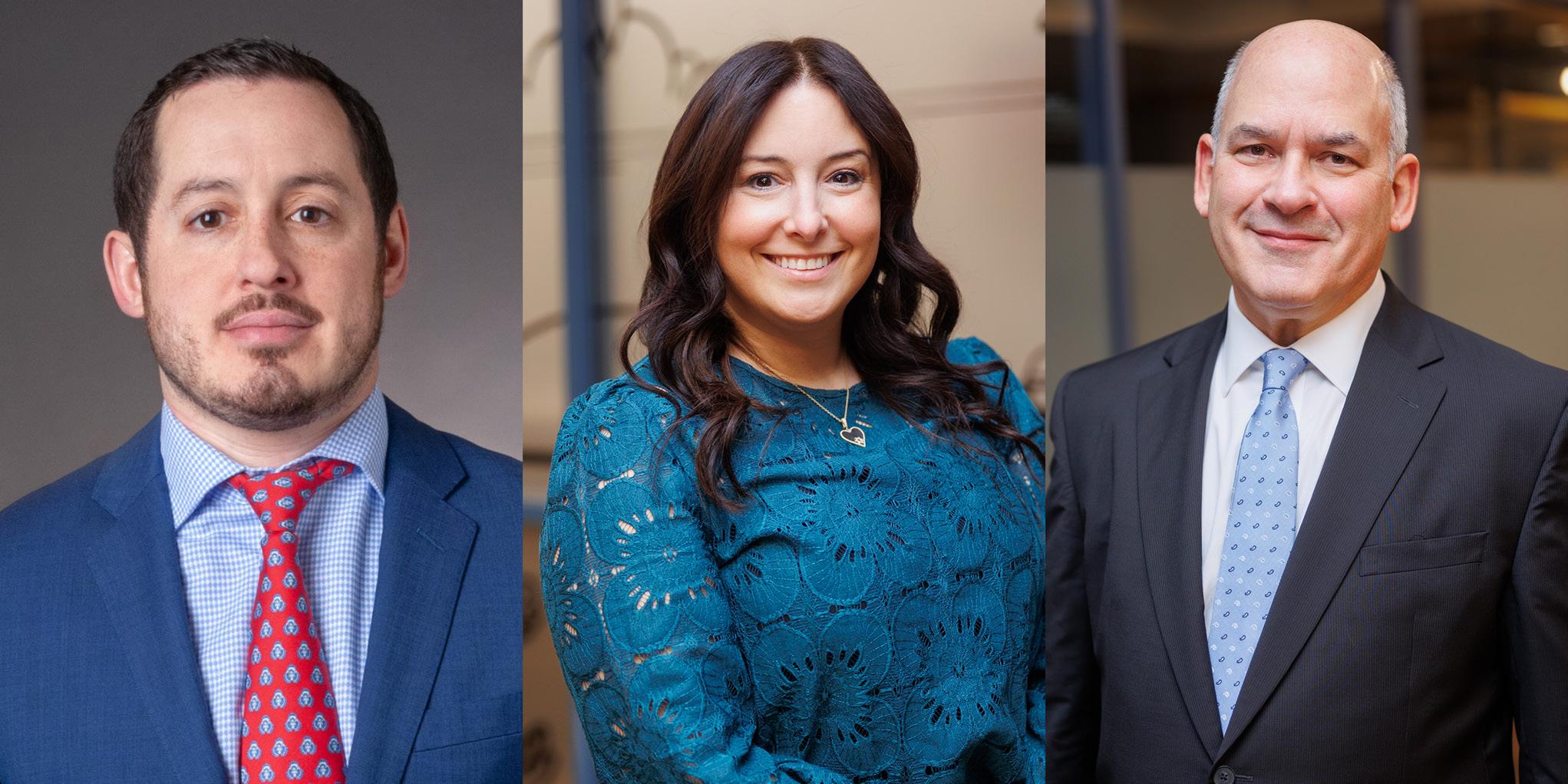
munity leaders.”
The Chronicle thanks the family of Betty Kalikow (z”l) for a copy of her 1958 book, “Mom’s Best Recipes: 151 Jewish-American Dishes.”
“The Foundation plays such a critical role in funding a wide range of needs for our broad KC Jewish community that might otherwise not be met,” Abelson said. “I think of the Foundation as a critical financial support structure for the entire community.”
As a trustee, Abelson hopes “to be able to continue the legacy of excellence JCF has had in maintaining and growing its investment pool to best aid our community.”
Abelson will serve on the Foundation’s Investment Committee.
Fineman is a proud professional volunteer and has been an active leader of the Jewish Federation for many years, both in Kansas City and Chicago, and Jewish Federations of North America. She is a past chair of the J-LEAD program, the current chair
of JCF’s Flo Harris Foundation and a member of JCF’s Grants Committee.
“JCF makes such a tremendous difference in Kansas City because not only does it encourage current or potential donor advised fund holders to proactively and intentionally prioritize philanthropy in their daily lives, but it also provides the tools, resources and wealth of knowledge that its fundholders often need to maximize the impact their donations can make,” she said.
“Throughout my volunteer work at JCF, I’ve been so thankful to see the way our foundation has been able to pivot in times of hardship and crisis,” Fineman continued. “When times are hard, JCF responds — and it can only do so because the board of trustees helps ensure that funds are allocated effectively to meet both current and future needs; encourages people to reinvest in our community to help sustain it; maintains a strong commitment to Jewish values while it supports both Jewish and general community nonprofits; and educates future philanthropic com-
Ross is retired from positions as partner at CBIZ CPAs and as senior executive at WageWorks (now Health Equity). He is a current board member and past treasurer of Congregation Beth Shalom, past alumni chairman of Alpha Epsilon Pi fraternity at Mizzou, and is a volunteer counselor in the AARP’s Tax-Aide program.
“The Foundation educates and innovates with programs that maximize the tax benefits of charitable giving,” Ross said. “It plays a crucial role in sustaining the Jewish organizations that support our community today and into the future.”
As a JCF trustee, Ross wants “to help the community understand JCF’s role in supporting our Jewish organizations today and sustaining them for generations to come.”
Ross will serve on the Foundation’s audit committee.
As part of the Jewish Community Foundation Board of Trustees, Abelson, Fineman and Ross will represent JCF in the community, help guide the Foundation’s policies and decision-making and provide financial and administrative oversight of the Foundation’s assets. More information about the Jewish Community Foundation and how it serves the community is available by contacting Josh Stein at (913) 327-8121 or jstein@jcfkc.org.


By Lindsey Lipsky Sasone Director
February is Jewish Disability Awareness In-
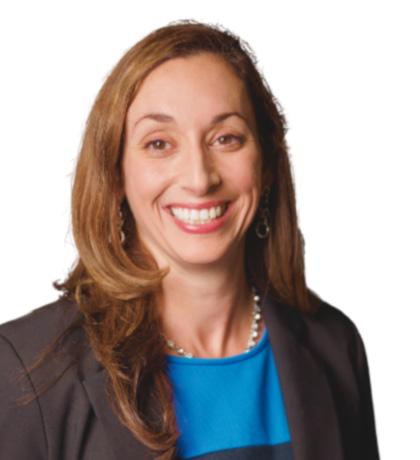
clusion Month (JDAIM), which aims unite Jewish communities around the country in support for individuals with disabilities and their right to be respected, valued and included in all aspects of Jewish community living.
“Mom, what is wrong with that boy?” my son, age 4, whispers innocently. I stop and look in the direction of his gaze. I see a sweet child, maybe seven or eight, with auburn curls. He is walking with a walker. I continue to push the shopping cart, smiling over at them. I am quiet, choosing my words carefully.
“That boy is using a walker to help him walk. We use our legs, but his walker is a tool so he can walk in the grocery store just like us. There is nothing wrong, it is just different.”
I wait. Seeing if he will ask more questions.
“Tools like in my toolbox?” he asks. “Yes,” I say, relieved the conversation is over when he asks to pick out the bananas.
Later on, I wondered. Did I do enough?
As a teacher in my early 20s, teaching students with more significant disabilities in a self-contained classroom, so often my students were “othered,” looked upon with confusion by their peers. There were field trips they weren’t invited to, games they never got to play, birthday parties they never got to experience. It broke my heart.
According to the most recent study by the Centers for Disease Control, now almost 1 in 4 individuals throughout the country have some type of disability. These disabilities can be apparent or non-apparent, temporary or permanent. You can be born with a disability or develop one later in life. In fact, if we are lucky enough to make it to old age, each one of us will become disabled at some point.
As we enter a new era, one now

where terms such as “equity, inclusion and disability” seem to be under attack, what better time to help counter this hate than by teaching our kids about differences and disabilities? As both a mom and special educator, here are my four top tips:
The word disability is not a negative word. In fact, most people with disabilities now prefer we use that term over antiquated language such as “special needs” or “handicapped.” Using outdated language, slurs or slangs harms individuals with disabilities immensely. Be mindful of how you describe and talk about individuals with disabilities.
Children make sense of their world through purposeful play and modeling from their caregivers. Read books that feature characters with disabilities. Watch age-appropriate shows with neurodivergent characters. Adapt games for all abilities, highlighting how tools like wheelchairs and ramps allow everyone to play. Go out in nature, observing how things and people are alike and different. Like biodiversity in nature, diversity in humans is normal and necessary.
Don’t
When out in the world, don’t shy away from your child’s observations and questions. Like my child in the grocery store, the questions may at first seem rude or inappropriate, but our kids look at us when they are feeling unsure or confused. Take the time to answer questions simply and succinctly, with as much or as little detail as your child needs.
Individuals with disabilities want to be included just like everyone else. Too often peers with disabilities are left out, which can have lasting consequences for kids both with and without disabilities. Wherever you can, make it a mission to include everyone.
If we want to help build a world where inclusion and acceptance are the norm, what better place to start than at home?
Sasone, our local community program that supports disability inclusion in Jewish education, has a list of resources to help support this work at sasone.org/resources.

A T . M A R 1 9 A . M . S h a b b a t d ' v a r T o r a h & K i d d u s h L u n c h e o n
a t C o n g r e g a t i o n
B e t h S h a l o m A l l a g e s
S A T . M A R 1
2 P . M .
H a n d s - o n S h a b b a t
C r a f t i n g a t T h e
T e m p l e , C o n g r e g a t i o n
B ’ n a i J e h u d a h
A d u l t s 1 8 +
K i d s C o m m u n i t y
W o r k s h o p a t T h e
J e w i s h C o m m u n i t y
C a m p u s
3 - 6 t h g r a d e r s
S U N . M A R 2
3 P . M .
S U N . M A R 2
9 : 3 0 A . M .
F a m i l y P o r t r a i t
W o r k s h o p a t T h e
J e w i s h C o m m u n i t y
C a m p u s
K i d s a n d t h e i r f a m i l i e s
Learn more & register here!


Editorials express the view of the writer and are not necessarily representative of the views of The Kansas City Jewish Chronicle staff, the Jewish Federation of Greater Kansas City, or the Kansas City Jewish Community as a whole.
I just can’t help myself. My niece has told me not to bother, but I keep at it. Ever since she moved back to Kansas City, I have tried to fix her up with a nice Jewish boy. Because she’s such a smart, beautiful, funny woman, I figure there must be hundreds of eligible guys out there who would be a perfect match for her. Sorry, guys, she won’t let me use her name. But since the Kalikows have lived in Kansas City for years, you might be able to figure out who she is.
Months before she arrived, I announced at one of my women’s groups, “My niece is moving back to Kansas City when she finishes her master’s degree. Does anyone know someone I could fix her up with?”
“I wish,” replied one woman. “If I did, I would fix up my own daughter.”
“Same here,” said another.
Those daughters, just like my niece, are probably glad to know we didn’t come up with any potential matches. Nonetheless, I hope they appreciate that our efforts are well-intentioned. Even the Torah backs us up. “It is not good for man [or woman] to be alone,” states the second chapter of Genesis.
Along with fulfilling a biblical commandment, other motivations keep me fixated on fixing people up. More than 20 years ago, I set up two Jewish colleagues at work who married shortly after meeting. They both continue to thank me for my matchmaking mitzvah. I’ve been trying to duplicate my success ever since.
As a widow looking back, I can happily report that the 30 years spent with my loving, caring husband were some of the best years of my life. I want the same for my niece. Yet there doesn’t seem to be many viable options for young people like her to meet these days.
Technology is often touted as the solution to finding a mate, but definitely has its drawbacks. A Pew Research Center 2023 survey of dating found that more than half of wom-
en using online dating services reported negative experiences. Myself included. Two years after my husband died, I tried JDate, but discovered that my mother had been right. Guys (some, anyway) are only after one thing, even into their 60s. The article I wrote about the experience for Hadassah Magazine was entitled “A Good Man Is Hard to Find,” which pretty much says it all.
As for face-to-face meetings, several Jewish organizations offer opportunities for singles. For instance, Jewish Federation of Greater Kansas City’s Young Adults Division sponsors three signature events specifically geared to 21-45-year-olds: Bagel Bash, a Purim/Passover gathering and Good Shabbos KC. Several local synagogues offer programming geared at young singles, such as B’nai Jehudah’s “Singles Mingle” and Kehilath Israel’s K.I. Next.
But whenever I suggest one of these to my niece, she tells me that she probably wouldn’t be interested in the kind of guy who would be there, echoing Groucho Marx’s famous quote, “I don’t want to belong to any club that would accept me.”
Which leaves yet one more option — a matchmaker. As we all know from that (dubious) historical authority — Fiddler on the Roof — this profession was prominent among Jews in the shtetl. Perhaps it’s time for modern, secular Jews to bring back this spouse-finding tradition.
I, for one, would gladly apply for the job. As Leo Rosten writes in “The Joys of Yinglish,” the task of the shadchan (matchmaker) “was considered a sacred matter. God was considered the Great Shadchen.” So, as the local Jewish matchmaker, I would be assisting both the divine and the Kansas City community. And maybe, instead of beseeching me to stop, my niece would even ask me to bring her a match. And I wouldn’t even require that she sing her request before I got to work.

By Micah Levine
I and 14 other young professionals had the distinct privilege to represent the American Jewish Committee in partnership with Japan’s Ministry of Foreign Affairs on a diplomacy trip to Japan, entitled “Kakehashi,” or “building bridges.” As laid out by Japan International Cooperation Center (JICE), our goal was to share knowledge and experience. What began as a mission to promote cross cultural understanding became a journey of discovery, revealing the profound impact an individual can have. I discovered the actions of a society, of a community, of an individual, can leave a lasting impact on this world for our generation and the next.
Japan’s society possesses a remarkable ability to respect and honor tradition while embracing modernity. The formality and detail to this care is evident in everyday gestures such as prioritizing elders in all aspects of life. This cultural ethos echoes the Jewish commandment to honor thy father and mother. Similarly, their culture places an emphasis on the collective over the individual, mirroring the Jewish value of tikkun olam — repairing the world for the collective good.
These shared principles set the stage for our diplomatic meetings. During our visit with the Israeli ambassador, we were struck by his observation of the near absence of antisemitism in Japan — a stark contrast to its prevalence on college campuses in the US today. We also met with representatives of
the US embassy who themselves were Jewish and related their experience living in the country.
We later engaged in dialogue with the Minister of Foreign Affairs of Japan, Mr. Fujii. He highlighted their commitment to global stability and concerns about regional challenges such as Iran’s aligning with their neighbors. We were also reminded of Japan’s relationship with Israel, particularly after the Oct. 7 attack, with their swift condemnation of Hamas and repeated push to free Israeli hostages. Japan sees itself as a leader in humanitarian response, and in doing so provides disproportionate aid to Ukraine. I remain hopeful that these shared values will pave the way for stronger ties between the two countries, committed to lasting peace and security.
One of the most poignant moments of the trip was visiting Tsuruga, the “Port of Humanity,” a historic town that served as a beacon of hope for thousands of Jews fleeing Nazi Germany. During our visit, we met with the mayor and toured the museum, learning about the Japanese diplomat Chiune Sugihara. Defying government orders, Sugihara issued travel visas to Jews in Lithuania, saving thousands of lives. In fact, one of our fellow participants, Dinor, recently discovered that her grandfather was one of the recipients of Sugihara’s travel visas. His life — and by extension, hers — was spared
continued on next page
continued from previous page
due to one man’s courage. Sugihara’s bravery is a testament to the profound impact one individual can have on the world — creating ripples of change that transcend generations.
Standing in Tsuruga, Dinor’s story reminded me of the Talmudic teaching: “Whoever saves one life, saves the entire world.” Each of us, as ambassadors for the Jewish community, has this opportunity to create similar ripples. Through advocating and engaging with other cultures, religions and governments, we build bridges of understanding and inspire the next Sugihara.
Later, in Kyoto, we visited Doshisha University and met an Israeli woman named Ada, who leads the Judaic Studies Department. We met with her Japanese students, some of whom studied Hebrew, Christian Zionism and theology. Ada shared that many of her stu-
dents know little about Jewish history or the Holocaust. While she dreams of taking her students to Hiroshima’s Holocaust Museum annually, financial constraints make this difficult.
As I reflect on my time in Japan, I am inspired by the possibilities of what we can achieve together. By building bridges — Kakehashi — between cultures, we create a stronger, more tolerant world for future generations. Let this be a call to action: In hopes of creating our own ripple effect here in Kansas City, I aim to establish a fund to send a cohort of Doshisha University Students to the Hiroshima Holocaust Museum annually. Please join me in creating a small ripple that could one day grow into a wave, even 6,000 miles across the Pacific Ocean. Whether through financial support, advocacy or spreading awareness, we can help make this dream a reality.

By Karen and Eitan Gerson
Eitan Gerson and 14 other North Americanhighschoolstudentsattended USYChidush’s first volunteer trip to Israel in December 2024.
Karen Gerson: “We learned about the program in October and Eitan immediately said, ‘Yes, I want to go.’ Eitan wanted to help out Israel in crisis and war, volunteer and help people in need and learn about what the government was doing to help those impacted by war. He also wanted to support families of the hostages and visit Hostage Square.”
Eitan Gerson: “I knew that I was one of only a few young people who had the
KU Hillel will host its annual Women’s Hoops Classic event, a celebration of both Hillel’s impact on Jewish college students and the KU women’s basketball team, on Sunday, March 2.
The event will begin with a community brunch at 1 p.m. at Allen Fieldhouse (1651 Naismith Dr., Lawrence, KS 66044), with tip-off at 3 p.m. All proceeds will benefit Jewish students

opportunity to go to Israel over winter break to just volunteer. My hope was that coming back home I could share my experiences and let people know what the feel of the people of Israel is. It felt like Israelis are trying to go about their days and create as “normal” a living situation as possible all while supporting and continuing to raise awareness of every single hostage.
“One of the most impactful mornings was driving up to [site of] the Nova Festival. We were able to walk around on our own, as well as our security guard, who is an IDF soldier, told us stories about the different events that happened on Oct. 7.”
at KU. The KU women’s basketball team will close out the regular season against Oklahoma State.
Tickets and sponsorship package information is available at kuhillel. org/hoops. Questions can be sent to Executive Director Ethan Helfand at ethanhelfand@kuhillel.org.
The Women’s Hoops Classic will be hosted by Herb Buchbinder and chaired by Eric Kaseff.
Women’s Hoops Classic
Sunday, March 2, 1 p.m. brunch, 3 p.m. tip-off
Allen Fieldhouse, 1651 Naismith Dr., Lawrence, KS 66044
Elizabeth “Beth” Noble, Ph.D. of education, prides herself in being a devout promoter of Jewish Family Services’ (JFS) services. She is an advocate, donor and client.
Noble first learned about JFS through one of her doctorate students back in the 1980s. Since then, she has referred several students to JFS for various services, especially its mental health therapy services.
“I love that JFS provides high quality services free of charge to those who need it,” Noble said.
Noble knows of JFS’ high quality services first-hand. About six months ago, Noble was experiencing undetermined anxiety that was keeping her from everyday activities like answering her door. With help from JFS intern therapist Jill Schmuke, Noble overcame her anxiety, using deep breathing techniques and talking through situations. Noble is grateful and relieved that her anxiety subsided.
However, this isn’t the first time Noble has utilized JFS’ services. Due to surgery complications for her macular degeneration in 2005, Noble was left 100% blind. Her blindness left her unable to distinguish between light and darkness. Noble regularly relies on JFS’ JetExpress program with its volunteer drivers to get her to dental and doctor appointments and some social activities.
“My JetExpress driver, Chip Ingram, goes the extra mile to help me feel comfortable and avoid long waits,” she said.
Noble’s career as a professor continued after she retired from teaching
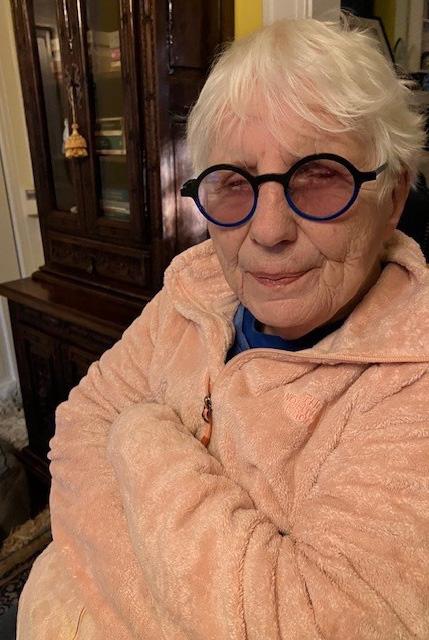
Ph.D. students in statistics and education at the University of Missouri-Kansas City (UMKC). She then taught women and royalty in Saudi Arabia and Malaysia for two more years.
After retiring a second time, Noble returned to Kansas City, which she has called home for decades. Noble loves UMKC’s Conservatory, KC Repertory Theater, the Kansas City Symphony and many others.
“I’ve always been involved in the community,” she said. “...I want to support organizations that support others. JFS has helped my students and me. I’m not Jewish, and it doesn’t matter to JFS. I’m one of JFS’ top promoters. I believe in JFS and its mission.”


By Syd Stoll
Kansas City Research Center Archivist
Editor’s note: The Chronicle thanks The State Historical Society of Missouri (SHSMO) for permission to republish this piece from its Missouri Timesmagazine.
Paging through the newly processed Howard Frederic Sachs Papers gives an excellent view of not only Sachs’ storied career in law and his work on civil rights issues, but also the history of Kansas City’s Jewish community from the 1950s to the 1970s. Sachs was a prominent Kansas City lawyer at the firm of Spencer, Fane, Britt, and Browne from 1951 to 1979. He was then nominated as a judge on the U.S. District Court for the Western District of Missouri by President Jimmy Carter and was confirmed in 1979. His papers were donated to SHSMO, along with the papers of 11 other federal judges, as part of a generous contribution from the Western District of Missouri Historical Society. The Sachs collection contains personal research and correspondence, materials from Sachs’s work with local Jewish organizations and legal materials from many
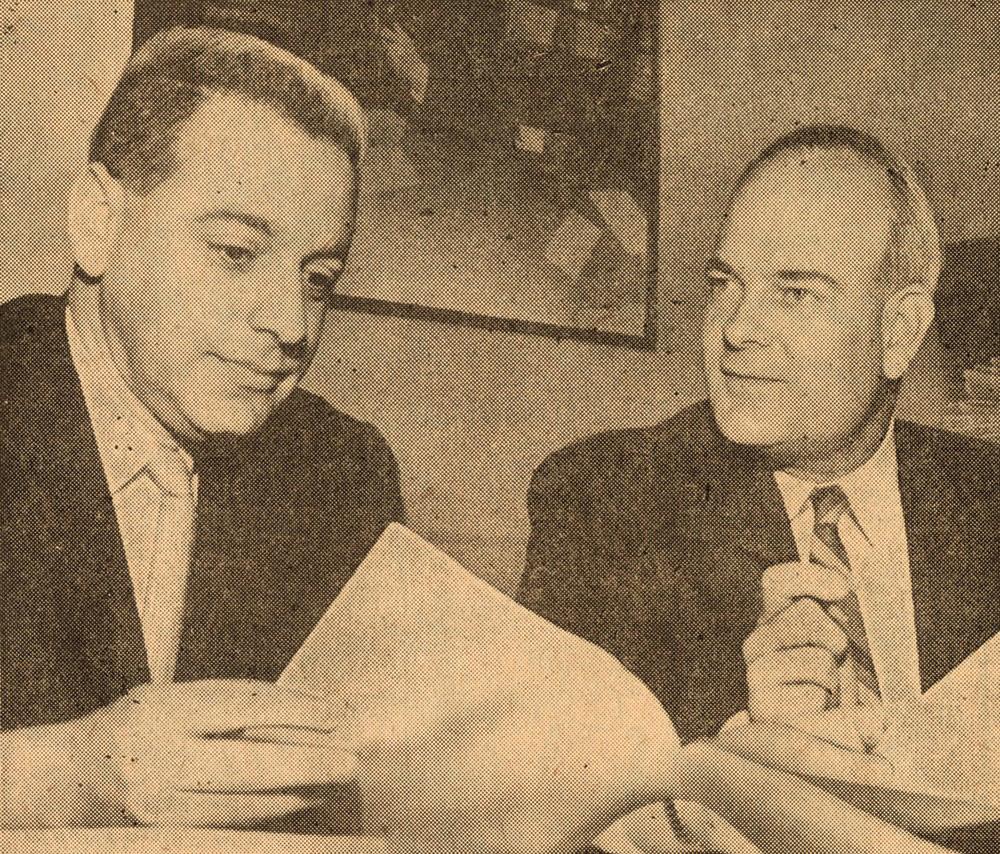
City Times, June 21, 1963)
of the cases that he worked on.
Sachs advocated for the interests of the Jewish community in Kansas City and served on multiple Jewish organizations. He also worked with Kansas City historian Frank Adler on research for the 100-year history of The Temple, Congregation B’nai Jehudah, “Roots in a Moving Stream.”
He notably advocated for religious freedom by working to remove mandatory prayers and other religious activities from local schools. In response to a letter from Congressman William J. Randall, who argued that school
prayer was popularly supported by his constituents, Sachs wrote that the inclusion of mandated prayer “would usurp parental rights in guiding the religious development of children, and which will lead to needless controversy between religious sects.”
Sachs also worked to combat antisemitism and discrimination in Kansas City social clubs. When it appeared that Jewish people were not welcome in prominent clubs such as the University Club, the Kansas City Club and the River Club, Sachs corresponded with their leadership, government officials and other prominent Kansas City businessmen. He made it clear that discrimination based on religion was unacceptable and that organizations should boycott these clubs until their policies changed. Sachs argued that “the Jewish community and Jewish families in Kansas City need to know that there are opportunities here at home.” His actions helped lead to the Kansas City Club admitting Jewish members. Sachs was accepted into the Downtown Club in 1964.
Sachs extended his efforts to influence other civil rights issues in Kansas
elderly.
City as well. He was the chairman of the legal committee of the Kansas City Commission on Human Relations. In this position, he helped draft the first civil rights ordinance adopted in Missouri. He also worked to desegregate the schools in Kansas City following the U.S. Supreme Court’s 1954 Brown decision that prohibits states from segregating public school students because of race. Sachs also worked on the public accommodations ordinance of 1963, which required theaters, bars and other Kansas City businesses to accept people of color as patrons. He also advocated for the Fair Housing Act of 1968, which banned discrimination in housing and real estate.
At age 99, Sachs is still serving as a federal judge. His papers offer researchers insight into the Jewish community as well as social justice issues affecting Kansas City in the latter half of the 20th century. The Howard Frederic Sachs Papers are available to view at the Kansas City Research Center.
Syd Stoll is an archivist at the Kansas City Research Center. More information about SHSMO and MissouriTimes isavailableatshsmo.org.
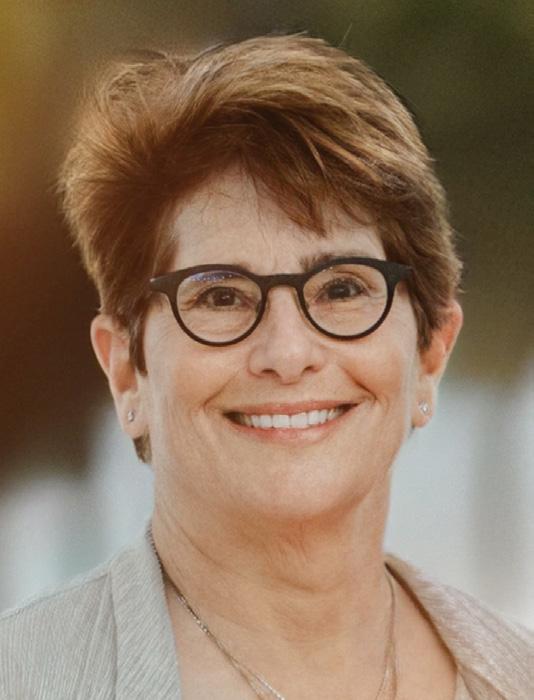
Louise Ryder Ackerman, 68, known as “Kitty” to some, passed away peacefully on Jan. 30 in Frisco, Texas. She was born on Oct. 23, 1956, in Kansas City, Missouri, to John Jacob and Elaine Baum Ryder.
Louise’s life was a testament to her deep compassion and unwavering commitment to her family and community by serving others. She graduated from the Barstow School in Kansas City and pursued her passion for understanding people by studying psychology and criminal justice at American University in Washington, D.C. She later earned a master’s degree in gerontology from Trinity University in San Antonio, Texas, and used her expertise to advocate for policies that improved the lives of the
In San Antonio, she met Russell Ackerman, the love of her life, at a volleyball game at the Jewish Community Center. Their 34-year marriage was filled with love and laughter, as they built homes together in several cities, including San Antonio, Dallas and Kansas City, and raised two remarkable children: Emily, a real estate agent in Chicago, and Benjamin, a nurse anesthetist in New York City. She also cherished their canine companions, Captain and Leo.
Louise’s career was centered around helping others. Her work in elderly services earned her recognition from the National Association of Area Agencies on Aging for outstanding contributions. She later became the executive director of the Jewish Community Archives of Greater Kansas City and eventually trained in mediation, co-founding a part-time mediation practice. She generously
volunteered her time with organizations such as Habitat for Humanity, Restart Homeless Shelter, Meals on Wheels and Safehome, as well as her children’s schools.
Beyond her professional and volunteer work, Louise’s creative spirit found expression in creating beautiful decorative glass art, bringing joy to those around her. Louise also loved the outdoors, reading, traveling, bicycling, exploring and learning about different cultures and backgrounds. Her curiosity enriched her experiences and deepened her connections with people from all walks of life.
She is survived by her devoted husband, Russell; her cherished children, Benjamin and Emily (Brian Saltzberg); her loving sisters, Joan Ryder (Robert Ludwig) and Suzanne Beatus; her mother-in-law, Jackie Ackerman; her brothers-in-law, Shawn Ackerman (Chi) and Darin Ackerman (Ally); her cousins, Jonathan Baum (Sarah) and
Barbara Kovacs Wright (Terry); and many beloved nieces and nephews. Louise was a truly special person — benevolent, intuitive, selfless and funny. Her kindness knew no bounds, always putting others — especially her children and husband — before herself and offering a listening ear or a helping hand without hesitation. She had an unwavering maternal instinct and incredible intuition, effortlessly understanding the needs of those around her and offering wisdom in the most unexpected moments. Her sense of humor was lighthearted and infectious, bringing laughter and warmth wherever she went. And with her endearing charm, she had a way of making everyone feel loved and appreciated — as if they had known her for years. Louise’s presence was a gift, and her spirit will live on in the countless
continued on next page
continued from previous page
lives she touched.
A celebration of her life will be held in the spring in Kansas City. In her memory, contributions can be made to Jewish Family Service of Greater Kansas City (5801 W. 115th Street, Suite 103, Overland Park, KS 66211) or a charity of your choice.
Richard Harlan Glass
Richard Harlan Glass, 82, of Overland Park, Kansas, passed away peacefully on Feb. 2. Born on April 4, 1942, Richard lived a life marked by dedication to family, community and his many passions.
Yudell Luke.
Molly grew up in Kansas City, Missouri, graduated from Southwest High School and graduated from the University of Michigan with concentrations in psychology and economics. From there she attended the University of Southern California, where she received a master’s degree in social work and later, a master’s degree in business administration.

Dawn Gapen Bloom passed peacefully on the morning of Feb. 8, with her husband, Randy, at her side. Dawn was a caring and thoughtful wife, mother, sister and friend who fought cancer valiantly.
Dawn was born to Peggy Frazier Gapen (1945-2021) and Tom Gapen in El Cajon, California. Dawn grew up in El Cajon and followed her passion in pursuing psychology at the University of San Diego. Through graduate school, she met her husband, Randy Bloom. Together they shared a beautiful life and family. Dawn was a clinical psychologist and was a trusted and renowned provider to the Kansas City area.
Dawn is preceded in death by her mother, Peggy; and survived by her father, Tom; brother, Sean Gapen; and three sons, Evan Bloom, Garrett Bloom and Dylan Bloom.
Dawn cherished her family and those close to her. She was a constant source of love, warmth, kindness and unwavering support to others and excelled at seeing the best in those around her. Whether it be family vacations, lake weekends or trying a new restaurant in town, Dawn was happiest when she could share her joy and love with those close to her.
Funeral services will take place on Sunday, Feb. 16 at 2:00 p.m. at Louis Memorial Chapel. The family will be receiving guests and condolences beginning at 1 p.m. A private burial will take place at Rose Hill Cemetery following the funeral service. In lieu of flowers, donations may be made to the Leukemia and Lymphoma Society (lls.org). Online condolences for the family may be left at louismemorialchapel.com.
A graduate of Southwest High School and the University of Denver, Richard began his career in the restaurant industry as the owner of Max’s Drive In at 47th and Paseo. He later transitioned into a successful 30-year career with New York Life Insurance. Following his retirement, Richard remained deeply engaged in his community, serving two terms as president of Kehilath Israel Synagogue and as a course marshal at St. Andrews Golf Course. He also contributed to the Overland Park Home Association.
Richard proudly served six years in the National Guard and was a lifelong supporter of Kansas City sports. He was a season ticket holder from the Royals’ inaugural season and for the KC Monarchs. His love for culture and the arts was evident in his regular attendance at the symphony and theater. An avid golfer and BBQ chef, Richard brought joy to those around him through his hobbies and generosity.
He is survived by his beloved wife, Barbie Glass, of Overland Park; his sons, Louis (Sandi) Glass of Leawood, Kansas, Douglas Glass of Brooklyn, New York, and Trent (Jana) Glass of Lawrence, Kansas; his grandson, Jett Morrissey, of Leawood; and his sister Janice (Sheldon) Steinhauser of Denver, Colorado; along with many cherished nieces, nephews and cousins. He was predeceased by his parents, Max and Charlotte Glass; siblings Barbara Manion and Larry Glass; in-laws Imie and Bess Garelich; sister-in-law Sharon Swidler; and niece Ashley Swidler. Funeral services were held on Feb. 4 at Kehilath Israel Synagogue at 11 a.m., followed by shiva at the synagogue on Feb. 5 and 6. May Richard’s memory be a blessing to all who knew him.
Molly Luke Kaufman passed away quietly on Feb. 5 in Palo Alto, California. She was born on Sept. 23, 1943, to LaVerne and

Molly enjoyed two careers. She was a clinical social worker for 20 years. After that, she joined a technology company in Santa Clara, California, and spent the next 20 years in human resources administration working as a director and vice president for a large Japanese corporation. Once retired, she joined a knitting/crochet shop and worked part-time for several years. She made beautiful clothes, afghans and sweaters. Her hobbies included walking, knitting and crocheting, bridge and other lighthearted card games. She was predeceased by her husband, Phillip Kaufman, whom she met at the University of Michigan; her parents; and her sister, Linda Gurin.
Molly is survived by her children, Michelle (Bill) Futornick and Matt (Karen) Kaufman; and her four grandchildren, Aviva Futornick, Shira Futornick, Phillip Kaufman and Zosia Kaufman. She is also survived by her sisters Janis Koike of Springfield, Virginia, and Debra Singer of Olathe, Kansas.
Settling in Kansas City, where he grew up alongside four older brothers — Eddie, Michael, Morton, and Robert — and later met his wife, Elaine. Neal and Elaine were blessed with 66 wonderful years of marriage and four dynamic children — Dennis (wife Julie) of Palos Verdes, California; Jeff (wife Tracey) of St. Louis, Missouri; Mike (wife Stacey) of St. Louis; and Pamela (husband Jack) DiCapo of Kansas City, Missouri.
Neal’s life was deeply rooted in community, service and a love for the people around him. He proudly served in the U.S. Navy, stationed in San Diego and Alaska, before returning home to Kansas City, where he dedicated 25 years as a firefighter. When he wasn’t at the fire station, he could be found at Hankin’s Jewelry, the downtown store he and his wife owned and operated for two decades — a true reflection of his hard work and commitment to family.
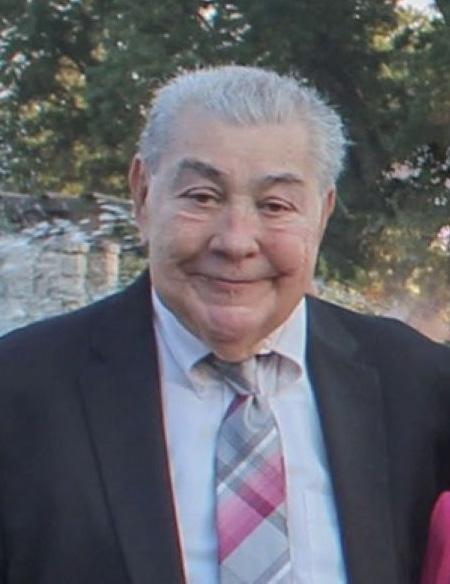
Neal Singer, born on Nov. 11, 1933, in Warsaw, Poland, passed away on Sunday, Feb. 2, at the age of 91. He was the cherished son of the late Al and Faye Singer and a beloved brother, husband, father, grandfather and friend.
At just three years old, he immigrated to the United States with his family.

Beyond his career, Neal embraced life with warmth and a playful spirit. He was a fixture at the poker table with his buddies, a lover of live music and theatre and always armed with a joke to share. He had a deep appreciation for good food, never turned down the challenge of a game show, and he made it his mission to bring a smile to those around him. Nowhere was this more evident than in his role as a grandfather. Neal adored his seven grandchildren — Lauren (Luke) Marvine, Alexandra (Rishi) DiCapo Patel, Jessica (Jeff) Alexander, Jordan, Natalie, Danielle and Taylor — and his two great-grandchildren, Penelope and Mila DiCapo.
Neal is survived by his wife, children, grandchildren and great-grandchildren. To say he will be missed by all is an understatement, but his memory will live on through his family — who will cherish fond memories for years to come.
In lieu of flowers, please make a donation in Neal’s memory to a charity of your choosing. A funeral and celebration of Neal’s life was held on Feb. 5 at Louis Memorial Chapel.


Programs for every age & stage of life
20 New Funds
$6,764 Granted by B’nai Tzedek Fund-holders to 37 Recipient Organizations
B’nai Tzedek: Youth Philanthropy Program

Donor Advised Funds: Charitable Giving Accounts
23 New Donor Advised Funds
$19.5 million Granted by DAF Fundholders

45 J-LEAD Members
$22,630 Granted to 5 Recipient Organizations
J-LEAD: Young Adult Giving Circle
Create a Jewish Legacy: Planned Giving

13 New Endowment Book of Life Signers
$5.1M Planned Gifts Realized
For more information about JCF and its impact, visit jcfkc.org or call (913) 327-8245.